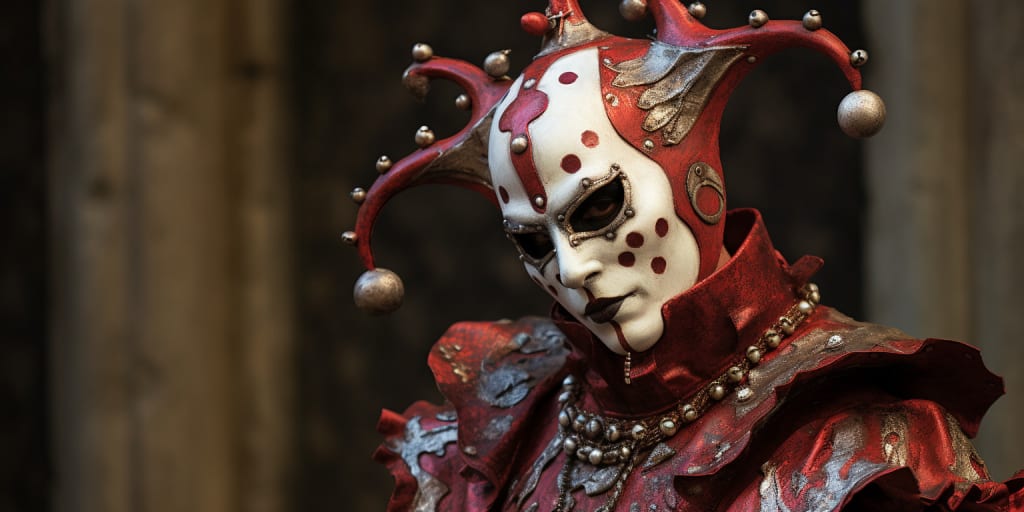Beyond Buffoons: The Multifaceted Legacy of History's Jesters
Entertainers, Critics, and Trusted Companions at the Courts of Power

The Jesters: Entertainers, Critics, and Court Companions
Unmasking the Rich Tapestry of Jesters in History
In the annals of history, jesters have often been portrayed as mere buffoons, entertaining royal courts with their antics and jests. Yet, the role of jesters transcends mere merriment and reveals a rich tapestry of entertainers, critics, and trusted companions who held unique relationships to power. This exploration unveils the intriguing world of jesters across different times and cultures.
The Jest: A Weapon of Words
The legend of Jing Xinmo, a 10th-century Chinese jester, paints a vivid picture of the jester's audacity. Chased by a dog and daringly teasing the Chinese emperor about his children's behaviour, Jing found himself facing the emperor's arrow. Instead of pleading for his life, he cracked another joke, and humour prevailed over offense. Contrary to common belief, jesters were not exclusive to medieval Europe. You Shi, a jester in 7th century BCE China, is often considered the first reliably recorded jester. He declared that, as a jester, his words could not give offense—a privilege crucial to the jester's role, even though it was occasionally violated.
The Many Paths to the Court
Jesters found their way into the royal courts through various routes. Some were appointed due to physical or neurological differences, while others were plucked from a pool of entertainers. In the 1530s, a royal servant recommended a young boy to replace King Henry VIII's aging jester, Sexten, assuring the king that the newcomer would be much more pleasant. These jesters brought unique talents to their roles. Take, for example, Roland the Farter, a 12th-century court jester in Henry II's court. Every Christmas, he performed a special routine, culminating in a simultaneous jump, whistle, and fart.
Jesters as Influencers and Truth-Tellers
Jesters held a peculiar power—the ability to influence important decisions. Among the Tübatulabal nation of the Sierra Nevada mountains, jesters had the authority to prompt elders to appoint a new chief if they believed the current leader was leading poorly. Moreover, jesters could sway even the mightiest rulers with their wit and satire. Jing Xinmo, for instance, managed to change the course of the Chinese emperor's hunting sprees. When a local magistrate requested the emperor to spare farmland from trampling, Jing facetiously suggested the magistrate's immediate execution, proposing that the peasants starve instead. The emperor, seeing the absurdity in his own actions, pardoned the magistrate.
Walking the Tightrope: Risks of Mockery
While jesters often pushed boundaries, they weren't immune to consequences. Some jesters faced dismissal or even death for taking their mockery or criticism too far. Archy Armstrong, a Scottish jester in 1638, found himself banished from the court after humiliating the Archbishop of Canterbury, who had revised the Scottish Book of Common Prayer, an act that incited riots. Archy asked the Archbishop, "Who's the fool now?" Three years later, after the Archbishop's arrest, a pamphlet circulated that ridiculed him, allegedly authored by Archy. Nevertheless, some jesters openly mocked their royal patrons without repercussions.
The Power of Wit and Truth
Jesters, such as 11th-century Persian jester Talhak, boldly confronted rulers with humour. Talhak suggested the sultan was a cuckold, implying his wife's infidelity. When the sultan rested his head on Talhak's knee and inquired about his relation to cuckolds, Talhak fearlessly responded, "I am their pillow." Even during eras when rulers were deemed divinely appointed, jesters like Karim Shir'ei in 19th-century Persia used humor to address sensitive issues. When the shah questioned whether there was a food shortage, Karim Shir'ei retorted, "Yes, I see Your Majesty is eating only five times a day." These jesters, through riddles, jokes, and skits, managed to reveal who the true fools were, speaking truth directly to power.
In conclusion, jesters throughout history were more than just jesters. They were astute observers, fearless critics, and trusted companions who used humor as both a shield and a sword. Their stories serve as a testament to the power of wit and satire in navigating the complex web of royal courts and societal norms.
About the Creator
Cameron Mcfarland
📚 Aspiring Writer and Article Enthusiast 🌟
🌼 20 Years Young | Passionate about Crafting Stories 🖋️
Join me on this journey through the world of words as we embark on a literary adventure together!






Comments
There are no comments for this story
Be the first to respond and start the conversation.